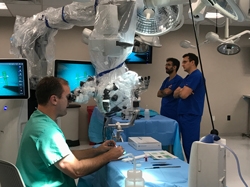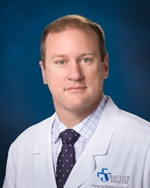Neurosurgeons Without Borders

The nylon suture looked like a fine piece of hair, but neurosurgeon Ricardo Hanel, MD, deftly twisted it through a silicone vein – all while peering through a microscope.
A team of 12 Brazilian doctors watched the microsurgery simulation, studying Dr. Hanel’s technique closely. In short order, he completed the vascular suturing procedure, one used by surgeons to re-route blood around a congested artery.
It wasn’t an uncommon tactic, nor one the Brazilian doctors hadn’t seen before. Instead, what they watched intently was how adeptly Dr. Hanel completed the suture.
“He makes it look so easy,” said Roberta Santos, a research fellow. “Being able to operate while looking through a microscope is hard. That’s why it’s so important to have these exercises. You don’t want to practice on a human.”

The training at Zimmer Biomet, a medical device company, formed part of the curriculum for a 10-day training seminar.
Lyerly Neurosurgery, an affiliate of Baptist Health, partnered with the Brazilian Society of Neurosurgery to bring 12 Brazilian doctors to Jacksonville to work closely with the Lyerly team while also immersing themselves in some of the technology offered in America. The seminar, which will hopefully become a yearly program, is called “Techniques and Technologies in Neurosurgery.”
Beginning Sept. 27, the group spent most of their time training at Baptist Medical Center Jacksonville. They also visited nearby labs at two medical device companies: Zimmer Biomet and Medtronic.
“The idea is to give the residents at a young age an idea of what is outside their country,” said Dr. Hanel, co-medical director of the Baptist Stroke & Cerebrovascular Center. “Training like this leads to decisions that will change their lives and the lives of the many patients they see in the future.”

Dr. Hanel, who is Brazilian, said when he was studying medicine there were few opportunities to gain experience outside his own community – and if there were, it was costly. He earned his medical degree and then completed his neurosurgery residence in Brazil.
"Training in Brazil is very similar to America," Dr. Hanel added, but the technology and intensity are night and day. He hopes the program teaches the residents they don’t need a fancy facility to improve their skills.
At the end of the training seminar, each resident will leave Jacksonville with a training kit they can take back home to Brazil.
The Brazilian doctors were chosen from the country’s top schools, based on tests they complete each year.
Orlando Maia, a Brazilian neurosurgeon who heads the Brazilian Society of Neurosurgeons, said the group saw a much more open-minded way of doing things here at Baptist Health Medical Center.
“It’s a very collegial environment,” Dr. Maia, who spoke in Portuguese while Dr. Hanel translated, said. “In Brazil, it’s much more hierarchical.”
Dr. Hanel showed residents a variety of endovascular skills, including the pipeline procedure he helped to pioneer.
When treating an aneurysm, the pipeline -- a braided cylindrical mesh known as a flow diverter -- can be inserted through a microcatheter into an artery in the groin. Then, the device is threaded through the body to the brain to slow the flow of blood into the aneurysm and allow the diseased vessel to heal.
“Mostly, we’ve learned the importance of having a great team working with you,” said Carlos Ferrarez, a resident from Minas Gerais, Brazil. “Sometimes, we don’t have many resources and so it’s hard to know what we would do with them.”